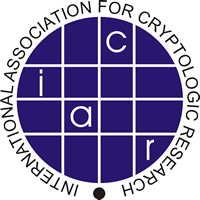eprint.iacr.org/2002/026
Preview meta tags from the eprint.iacr.org website.
Linked Hostnames
5- 24 links toeprint.iacr.org
- 1 link tocreativecommons.org
- 1 link toia.cr
- 1 link toiacr.org
- 1 link towww.iacr.org
Thumbnail

Search Engine Appearance
Generic Groups, Collision Resistance, and ECDSA
Proved here is the sufficiency of certain conditions to ensure the Elliptic Curve Digital Signature Algorithm (ECDSA) existentially unforgeable by adaptive chosen-message attacks. The sufficient conditions include (i) a uniformity property and collision-resistance for the underlying hash function, (ii) pseudo-randomness in the private key space for the ephemeral private key generator, (iii) generic treatment of the underlying group, and (iv) a further condition on how the ephemeral public keys are mapped into the private key space. For completeness, a brief survey of necessary security conditions is also given. Some of the necessary conditions are weaker than the corresponding sufficient conditions used in the security proofs here, but others are identical. Despite the similarity between DSA and ECDSA, the main result is not appropriate for DSA, because the fourth condition above seems to fail for DSA. (The corresponding necessary condition is plausible for DSA, but is not proved here nor is the security of DSA proved assuming this weaker condition.) Brickell et al., Jakobsson et al. and Pointcheval et al. only consider signature schemes that include the ephemeral public key in the hash input, which ECDSA does not do, and moreover, assume a condition on the hash function stronger than the first condition above. This work seems to be the first advance in the provable security of ECDSA.
Bing
Generic Groups, Collision Resistance, and ECDSA
Proved here is the sufficiency of certain conditions to ensure the Elliptic Curve Digital Signature Algorithm (ECDSA) existentially unforgeable by adaptive chosen-message attacks. The sufficient conditions include (i) a uniformity property and collision-resistance for the underlying hash function, (ii) pseudo-randomness in the private key space for the ephemeral private key generator, (iii) generic treatment of the underlying group, and (iv) a further condition on how the ephemeral public keys are mapped into the private key space. For completeness, a brief survey of necessary security conditions is also given. Some of the necessary conditions are weaker than the corresponding sufficient conditions used in the security proofs here, but others are identical. Despite the similarity between DSA and ECDSA, the main result is not appropriate for DSA, because the fourth condition above seems to fail for DSA. (The corresponding necessary condition is plausible for DSA, but is not proved here nor is the security of DSA proved assuming this weaker condition.) Brickell et al., Jakobsson et al. and Pointcheval et al. only consider signature schemes that include the ephemeral public key in the hash input, which ECDSA does not do, and moreover, assume a condition on the hash function stronger than the first condition above. This work seems to be the first advance in the provable security of ECDSA.
DuckDuckGo
Generic Groups, Collision Resistance, and ECDSA
Proved here is the sufficiency of certain conditions to ensure the Elliptic Curve Digital Signature Algorithm (ECDSA) existentially unforgeable by adaptive chosen-message attacks. The sufficient conditions include (i) a uniformity property and collision-resistance for the underlying hash function, (ii) pseudo-randomness in the private key space for the ephemeral private key generator, (iii) generic treatment of the underlying group, and (iv) a further condition on how the ephemeral public keys are mapped into the private key space. For completeness, a brief survey of necessary security conditions is also given. Some of the necessary conditions are weaker than the corresponding sufficient conditions used in the security proofs here, but others are identical. Despite the similarity between DSA and ECDSA, the main result is not appropriate for DSA, because the fourth condition above seems to fail for DSA. (The corresponding necessary condition is plausible for DSA, but is not proved here nor is the security of DSA proved assuming this weaker condition.) Brickell et al., Jakobsson et al. and Pointcheval et al. only consider signature schemes that include the ephemeral public key in the hash input, which ECDSA does not do, and moreover, assume a condition on the hash function stronger than the first condition above. This work seems to be the first advance in the provable security of ECDSA.
General Meta Tags
13- titleGeneric Groups, Collision Resistance, and ECDSA
- charsetutf-8
- viewportwidth=device-width, initial-scale=1, shrink-to-fit=no
- citation_titleGeneric Groups, Collision Resistance, and ECDSA
- citation_authorDaniel R. L. Brown
Open Graph Meta Tags
7- og:imagehttps://eprint.iacr.org/img/iacrlogo.png
- og:image:altIACR logo
- og:urlhttps://eprint.iacr.org/2002/026
- og:site_nameIACR Cryptology ePrint Archive
- og:typearticle
Link Tags
4- apple-touch-icon/img/apple-touch-icon-180x180.png
- shortcut icon/favicon.ico
- stylesheet/css/dist/css/bootstrap.min.css
- stylesheet/css/eprint.css?v=10
Links
28- https://creativecommons.org/licenses/by/4.0
- https://eprint.iacr.org
- https://eprint.iacr.org/2002/026.ps
- https://eprint.iacr.org/about.html
- https://eprint.iacr.org/archive/versions/2002/026